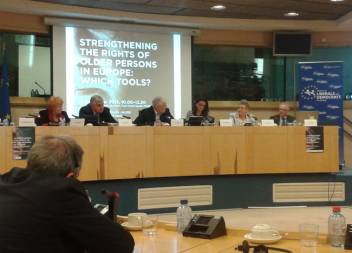 Affliates of the HelpAge global network were out in force at this year’s European Development Days (EDDs) conference in Brussels last week, united in our aim to call attention to an otherwise largely neglected topic: global population ageing.
Affliates of the HelpAge global network were out in force at this year’s European Development Days (EDDs) conference in Brussels last week, united in our aim to call attention to an otherwise largely neglected topic: global population ageing.
Representatives from Age International, HelpAge Espana, Slovene Philanthropy and HelpAge International in Brussels challenged the positions of high profile panellists during a series of lively discussions about what exactly should be included in the post-2015 framework.
Equality, inclusivity and rights
Equality, inclusivity and rights were distinct threads throughout the two days, and some specific references were made to older people.
At the discussion “Will a rights-based approach make development more human?” Ignacio Saiz, Executive Director at the Center for Economic and Social Rights said that inequality was “one of the biggest blindspots of the MDG process”.
He added: “It is critically important that the rights of older persons are visibly and cross-cuttingly addressed in the post-2015 framework […]. Particularly given the demographic changes in our societies, older persons’ rights are taking on increased relevance.”
Saiz said that the MDGs’ focus on aggregate level achievements had “masked and papered over widening disparities” and that we need “a much more disaggregated approach”. He then referred to the debate that is currently in progress on the creation of a human rights convention on the rights of older persons.
Engineering a data revolution
Data was another hot topic. In the sessions on “Agriculture in Africa today” and “Engineering a data revolution”, we pointed out that we need to get back to basics in the data revolution and ensure that we have internationally comparable data disaggregated by age, as well as by gender, disability and other factors.
It is encouraging that this type of disaggregated data is included in the World Bank study of agriculture in six different African countries, which will be used to determine how money is invested and to guide agricultural policy-making.
During a discussion on multidimensional poverty, Sabina Alkire of the Oxford Poverty and Human Development Initiative explained that a new tool to measure poverty along a range of indicators includes gathering data according to age, as well as other factors.
In a session on health, there was a mention of the specific health issues of older people and the link between chronic disease and ageing. “To finance health a demographic approach must be taken to catch up with the ageing population,” said Remco Van de Pas of the Wemos Foundation.
Few mentions of older people
But despite the undeniable fact that populations are ageing all around the world, explicit references to older people, and their specific needs and rights, were disappointingly few and far between.
While the Belgian Minister for Development Cooperation voiced clear support for a universal and entitlements-based approach to social protection, there was no discussion of the value of social protection floors in the session on social protection and inclusive growth.
Social protection floors are a key component of the HelpAge network’s post-2015 recommendations and an essential step if we are to ensure that everyone has a decent standard of living.
Opportunities were missed by the event organisers in a range of sessions to bring issues of ageing into the debate, with the focus remaining firmly fixed on the youth population and women of child-bearing age.
Even where the discussion revolved around much-needed gender equality, little or no attention was given to older women other than what was mentioned by the HelpAge International delegation.
Our experience at the EDDs shows that it’s possible to bring issues of population ageing into the consciousness of policy makers and stakeholders, but it also highlights how far we still have to go.
When will older people be considered alongside younger generations as a legitimate part of international development?
What next?
Visit the post-2015 section of our website and read our key messages.
Read more about our delegation at the European Development Days.
The work of the HelpAge EU network is partly funded by the European Union.
The contents of the materials available on this page are the sole responsibility of HelpAge International and can in no way be taken to reflect the views of the European Union.

